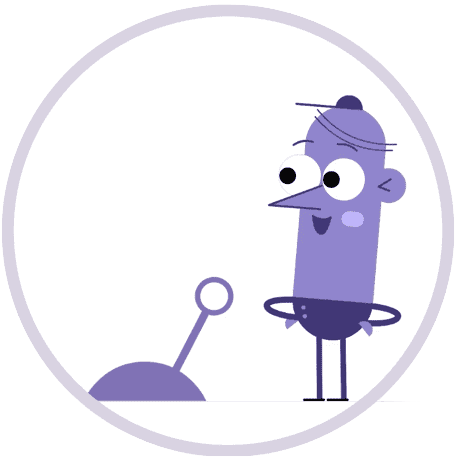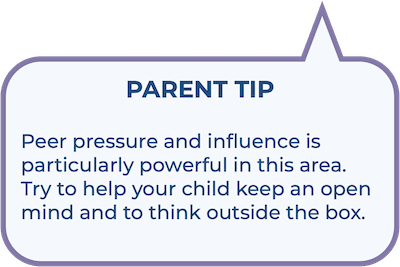Grade 11
Finding the right courses for you
In this section you can:
- Learn about testing from the experts.
- Take Action now that will make a difference.
- Eplore some critical questions that need to asked.
- Get answers to your frequently asked questions.
- Explore what others think about course selection.
- Tell us what you’re on your mind…

The Expert View
Find out everything that is important to know about course selection from our resident expert.
Read this to get the complete picture…

Introduction
‘All my friends know what they want to study, and I don’t.’
This is a comment we have heard regularly over the last 20 years from anxious students coming into the office. We can fully understand why a student may feel this way, there are just so many courses and so many universities to choose from. The challenge for the counsellor is to allay students’ anxiety and help them move forward towards selecting a university course.
So back to the student’s comment, and how to answer it. Our answer runs along the lines of, ‘most of your friends don’t know either, because I interview all of them. You are only 17 years old, and there are tens of thousands of courses out there to choose from, why at this stage would you know which one to study?’.
A parallel student concern is: ‘supposing I make the wrong choice and I don’t like the course.’
Well, this can happen and that is why approximately one third of students change university or course during their bachelor program. There is nothing wrong with this, you shouldn’t expect to get everything right the first time.

Some critical questions that need to be asked
Sometime the questions are more important than the answers.
question 1:
♥️ What do you love doing? ♥️
question 2:
Is a University that values standardized testing really the best place for an IB student?
How to find the right course…
There are many different ways to begin, however the best way is to begin with the you, the student. You are at the center of this, so let’s begin with a few questions that will hopefully narrow things down and eventually lead you to produce a short list of universities to apply.
Let’s start with the simple things:
List 10 things you love doing. If you have listed sport and travel, you can study international sports management… even become a famous footballer ☺. If you’ve listed caring for a sick relative, then you could consider medicine or nursing.
Next, move on and make a list of your strengths and weaknesses. Sometimes knowing what you do not like doing will avoid you moving into the wrong course/ career. E.g. If you do not like speaking in front of groups, then it is probably best not to become a TV presenter.
Now move on to:
- Ideas resulting from psychometric careers testing. Identifying areas of strengths and interests.
- Which are your best subjects in school?
- Which subjects do you find most interesting?
- How would these subjects lead onto a university course? (Consider prospective careers and employment opportunities.)
- Which university courses do your IB subjects qualify you to apply to?
- Are you aware of all the courses at university that are not offered as school subjects? (Check a uni website, you will be amazed!)
It is often the case that a student in Grade 12 has not firmed up their university subject choice, this predicament is particularly prevalent amongst top students who would excel in all their subjects. They could theoretically study anything from engineering to psychology to politics to languages etc.
Are you still unsure about what to study, then let’s look at universities and countries where the system is open and flexible and does not tie you into a particular subject even before you reach university. Deciding what to study is a tough call to make at the beginning of Grade 12. Some students already know for sure what to study, for those who don’t you can go to university and take a broader program and during the 3 to 4 years studying your bachelor’s degree; you will be exposed to new ideas, new subjects and new professors. With all this new input and your increasing maturity, you will find the right path before the end of your bachelor degree. You can then specialize for your master’s degree. Employers are particularly interested in where and what you have studied for your master’s degree. This is called delayed choice.
So where are all these wonderful flexible courses? Well, they fall basically into two categories:
- Countries with flexible systems
- Particular subjects/ subject combinations
Let’s look first at countries with flexible systems systems, and by that I mean where you can go to university, take several subjects, change subjects and generally explore the academic offering. The USA is the first and most obvious country to look at, although there are others.
In the USA you can make an open application, meaning that you don’t have to nominate your major on the application form. This provides considerable flexibility as you move through four years of a bachelor’s degree. Generally speaking, the larger the university the more choice of subjects you can take.
Similar opportunities are also available in other countries e.g. Canada or Scotland. Although these countries do not provide quite as much breadth as a typical US college, there is considerable leeway to experiment by taking different subjects and changing your major part way through your bachelor degree. In Scotland for example, you would typically take three or possibly four subjects in years 1 and 2 before nominating one of these subjects to continue on with as your major in the final two years. (Scottish degrees are four years)
Action ideas
Things you can do that will make a big difference.
Idea 1:
Apply for pre-uni schemes
They help you make up your mind and are available either online or on campus.
Idea 2:
Sign up for a summer study program at university
Live on campus and get not only an insight into an academic program, but also make new friends and get that student feeling
Idea 3:
Check out work experience opportunities
Area specific considerations
Liberal Arts and Sciences
These have long been popular in the United States, and are rapidly gaining popularity in the UK and Europe. So what is a liberal arts and sciences program? This is a program where you can choose from a menu of different subjects, and gain enough credits to graduate. During the 3 to 4 years of your bachelor’s degree, you will be exposed to many subjects in different areas and by the time you come to the end of your bachelor degree you will know where your true passion lies. You can then specialize during your master’s degree. As just mentioned, there are many liberal arts and science programs offered in the UK and also in the Netherlands.
Joint degrees
This is where you will typically study two subjects, approximately 50% on each. If you still can’t make up your mind between two subjects, then this can be a good solution.
Major and minor
This is where a student takes a degree in a particular subject (the major) and then alongside you will study another subject (the minor). The mix between these two subjects varies, but timewise it’s typically 70: 30 or 80:20.
As you can see there is a great deal of flexibility if you just shop around. All of the above have the advantage of delayed choice. A student of only 17 years old does not need to select the subject in which they are going to specialize, this decision can be delayed until the you are 21 or 22 years old, and then you apply for a master’s degree. By that time you will have been exposed to a lot of new academic ideas and be a mature young adult.
It is worth pointing out that some university subjects will be unavailable because if a student is not taking the requisites combination of IB subjects in school. E.g. If you are not taking chemistry then you can’t apply to biochemistry or medicine.
Wigsbury Frequently asked questions
Quick answers to the important questions
I have good grades in all my IB subjects, I could go and study almost anything at University. What should I do?
You’re in a fortunate position. I suggest you start at the other end of the equation, what comes after university? What would you like to do for a career? And then look to see which university subjects prepare you for that career. It may be that you don’t know what career you want to do, go and have a look on a career’s exploration website. Also, have a look on the departmental websites of UK universities, they always have a list of jobs that their graduates have gone on to. You’ll be amazed at the diversity of jobs that a graduate can do.
e.g. A graduate in English literature may go on to a wide variety of careers – local government, education, business, lawyer, armed forces, media, event management, teaching etc.
I want to study film; my parents want me to study Business. Help!
There is a way to square the circle here, the first thing to do is talk to your college counselor he/she will have lots of ideas about how you can combine these two subjects. After all, the film and entertainment industry is a very big business. You can take a university course that mixes both business and film.
I want to study business but my grades are not very good, I might even fail the IB diploma. Does this mean I can’t go to university?
Not to worry, there are lots of places at university available to you. Firstly, some universities will take you anyway even if you fall below the magic 24 IB points. If, when your IB results are published, you have failed by a point or two, contact the university and ask them to take you anyway.
Additionally, many universities offer foundation degrees. This may mean you have to take an extra year, or you are put on probation for a few weeks at the beginning of year one and then if you pass a test you are allowed to continue on the full bachelor’s degree. Other universities have what they call a bridging program, again you are on probation for a few weeks and assuming that your grades are alright you can move smoothly onto the bachelor’s program.
There are also below degree level course typically one or two year programs and when you have successfully completed one of these programs you may be offered the opportunity to take an extra year and trade up to a full bachelor’s degree. So, as you can see there are many different ways to achieve your goal. Talk to your college counselor he/she will be able to help you find the right program to match your academic performance.
Are careers tests/ exploration programs useful?
Yes, they can help point in the right direction, focus your ideas and flag up ideas that you had not thought of. It is a good idea to take a test which includes psychometric profiling as this identifies relative strengths and weaknesses and makes suggestions of which areas you are best suited to study in.
Are rankings useful?
Rankings are useful up to a point, but you should remember that just because the university is ranked number 6 that it is not necessarily a better fit for you than the university ranked number 10. The rankings change each year. I would suggest that you have a look at the subject rankings and this will give you a ballpark figure of where the top 20 universities are for your subject, where the next 20 are etc.
How should I go about searching for courses?
Assuming you know what subject you want to study, you’ll find there are many universities offering your subject and that they will not all be identical. Just because the subject is called ‘economics’ at University A, does not mean it will be identical to a subject called ‘economics’ at University B. You must go on the university website and check out the course content. Have a look at what units you study in Year 1, Year 2 etc. and ask yourself the question, is this what I want to study?
I have decided what subject I want to study, but there is such a bewildering choice of very similar courses at many universities. How should I differentiate?
Look for add-ons, the extras. Try and find a course that will let you do an internship where you go to work in a company for a year, or a course where you can do an exchange with a foreign university, or a course where you can add an extra subject (elective) such as studying a new language. So instead of just studying business, why not study business plus Spanish?
You need to consider that when you finally finish university you will be competing for a job, and if you can offer the employer something extra over and above the basic academic program then this will give you the edge in a competitive job market.
Multiple Perspectives
It’s always better to consider a range of opinions… even if they’re not our own!
But which ones can you trust?!

